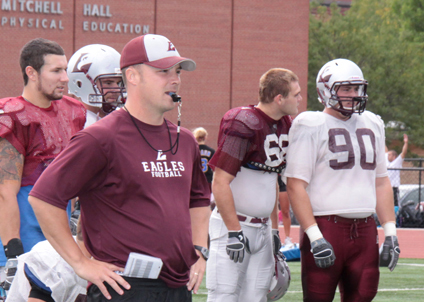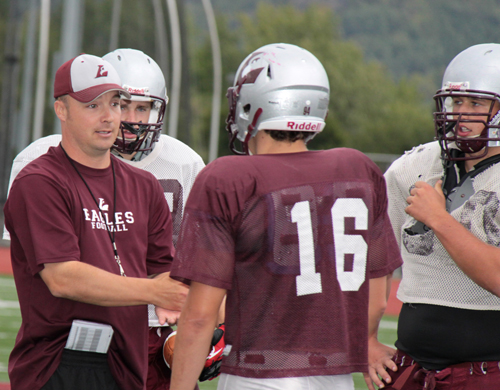Posted 8:49 p.m. Monday, Sept. 17, 2012
 [/caption]
UW-L Football Head Coach Joel Dettwiler recalls the day he picked up the phone — covered with dust after a long day working at a landfill. He was a construction engineer for a firm based in Madison when he got the call from UW-Platteville asking if he’d rather be a coach.
“It was a spontaneous decision,” he says. “I was following my heart so to speak. What I yearned for was togetherness. That’s what I loved about football.”
But Dettwiler says his master’s degree in civil engineering and engineering work experience weren’t put to waste when he accepted the job in summer 2000. He has used his math, statistics and problem solving skills every day on the field as he has coached for UW-Platteville, then Wartburg College in Waverly, Iowa, and for UW-L starting in fall 2011.
“Instead of thinking ‘Just hit harder and knock them down’ — there is a math side of football that people sometimes don’t see,” Dettwiler explains. “There are 11 players on their side and 11 on your side. If you can understand how to line up and organize yourself — and get your players to understand that — you can be successful.”
He teaches his players flexibility, so they don’t always line up in the same formation. They attempt to overload one side of the field on offense to bring the other team out of balance. On defense, the key is to stay as evenly distributed as possible, he notes.
“You have the ‘big, dumb jock’ stereotype that goes with football,” says Dettwiler. “We try to use the numbers and the math to be on the intelligent side of football.”
[caption id="attachment_15082" align="alignleft" width="500" caption="Head Football Coach Joel Dettwiler talks to players during a Wednesday evening practice."]
[/caption]
UW-L Football Head Coach Joel Dettwiler recalls the day he picked up the phone — covered with dust after a long day working at a landfill. He was a construction engineer for a firm based in Madison when he got the call from UW-Platteville asking if he’d rather be a coach.
“It was a spontaneous decision,” he says. “I was following my heart so to speak. What I yearned for was togetherness. That’s what I loved about football.”
But Dettwiler says his master’s degree in civil engineering and engineering work experience weren’t put to waste when he accepted the job in summer 2000. He has used his math, statistics and problem solving skills every day on the field as he has coached for UW-Platteville, then Wartburg College in Waverly, Iowa, and for UW-L starting in fall 2011.
“Instead of thinking ‘Just hit harder and knock them down’ — there is a math side of football that people sometimes don’t see,” Dettwiler explains. “There are 11 players on their side and 11 on your side. If you can understand how to line up and organize yourself — and get your players to understand that — you can be successful.”
He teaches his players flexibility, so they don’t always line up in the same formation. They attempt to overload one side of the field on offense to bring the other team out of balance. On defense, the key is to stay as evenly distributed as possible, he notes.
“You have the ‘big, dumb jock’ stereotype that goes with football,” says Dettwiler. “We try to use the numbers and the math to be on the intelligent side of football.”
[caption id="attachment_15082" align="alignleft" width="500" caption="Head Football Coach Joel Dettwiler talks to players during a Wednesday evening practice."] [/caption]
But Dettwiler says his math and science skills also come in handy for the less visible side of coaching. He sits down with football players every Wednesday night to offer informal math tutoring.
“If the head coach sits down and starts working on math with you — usually, you pay attention,” he says.
His own curvy-career path also gives him insight into how to help students with their transitions and life decisions. His perseverance through school at UW-Platteville, despite a 2.38 first semester grade-point average, helps him push his players to achieve academically.
“Some students think you’re this wizard who had no problems in school … I was a bad student my first semester and I learned from that,” says Dettwiler. “I will hold them accountable because if I can go through school and get my degree in engineering, they shouldn’t settle for a C.”
And many do make those high marks. UW-L student-athletes in 2011-12 posted the highest combined grade point average among the nine Wisconsin Intercollegiate Athletic Conference institutions, finishing with a cumulative 3.186 GPA.
Being a good football player is a lot like being a good student, notes Dettwiler. It has a lot to do with work ethic. And football is a great way to help students learn that ethic, he adds.
“We are teaching these guys how to be successful in class from the things we teach them on the field such as details, diligence and perseverance,” he says. “I’m not building bridges anymore, but I’m building students up to be successful. And, personally, I find more value in that.”
[/caption]
But Dettwiler says his math and science skills also come in handy for the less visible side of coaching. He sits down with football players every Wednesday night to offer informal math tutoring.
“If the head coach sits down and starts working on math with you — usually, you pay attention,” he says.
His own curvy-career path also gives him insight into how to help students with their transitions and life decisions. His perseverance through school at UW-Platteville, despite a 2.38 first semester grade-point average, helps him push his players to achieve academically.
“Some students think you’re this wizard who had no problems in school … I was a bad student my first semester and I learned from that,” says Dettwiler. “I will hold them accountable because if I can go through school and get my degree in engineering, they shouldn’t settle for a C.”
And many do make those high marks. UW-L student-athletes in 2011-12 posted the highest combined grade point average among the nine Wisconsin Intercollegiate Athletic Conference institutions, finishing with a cumulative 3.186 GPA.
Being a good football player is a lot like being a good student, notes Dettwiler. It has a lot to do with work ethic. And football is a great way to help students learn that ethic, he adds.
“We are teaching these guys how to be successful in class from the things we teach them on the field such as details, diligence and perseverance,” he says. “I’m not building bridges anymore, but I’m building students up to be successful. And, personally, I find more value in that.”
